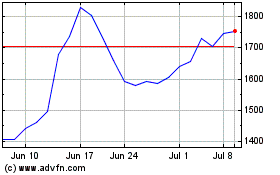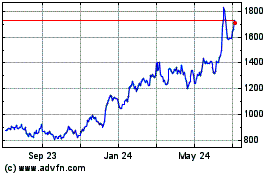By Ted Greenwald, Kate O'Keeffe and Tripp Mickle
The Trump administration's extraordinary intervention against
the $117 billion takeover of Qualcomm Inc. surfaced suddenly last
week. But it was months in the making.
In December, Qualcomm's leaders, reeling from a year of battles
with customers and regulators in the U.S. and abroad, faced the
prospect of losing the company to a hostile takeover by Broadcom
Ltd. in what would be tech's biggest-ever takeover.
One potential hurdle to the bid, Qualcomm executives discussed,
was a protracted national-security review, according to people
familiar with the matter. Qualcomm lawyers reached out to Covington
& Burling LLP, which suggested filing unilaterally and
proactively for review of a possible deal by the Committee on
Foreign Investment in the U.S. to understand the risks, the people
said.
It was an unusual strategy. Normally both parties in a deal seek
approval by making a joint filing before CFIUS, the secretive
federal panel that vets foreign purchases of U.S. companies on
national-security grounds. And they don't usually file until there
is an actual deal on hand. But in January, Qualcomm approved.
"You don't treat a hostile the same way you do when someone
walks in and says, 'You want to get married?' " said a person
familiar with the discussions.
Qualcomm's Jan. 29 filing to CFIUS helped trigger a chain of
events that culminated in President Donald Trump's decision Monday
to block the deal.
Qualcomm's appeal tapped into gathering concern among some
congressional Republicans and the Trump administration about U.S.
national security and competitiveness with China, especially in
advanced technologies -- sentiment that already was fueling an
effort to expand the power of CFIUS. The company also got help from
sympathetic senators and representatives who pressed the
administration.
The confluence of corporate self-interest and geopolitical
considerations not only enabled Qualcomm to turn the tables on
Broadcom, but canonized the San Diego company as a sort of national
champion essential to battling China's might in the next-generation
wireless communications technology known as 5G.
The administration's intervention was all the more unusual
because it centered less on Broadcom's origin -- it is a
Singapore-domiciled company with about half of its employees in the
U.S. -- than on the idea that its stewardship could undermine
Qualcomm's innovative prowess, and by extension U.S. clout against
China and its tech juggernaut, Huawei Technologies Co.
"The administration's decision is a recognition that, in the
digital age, national security has different requirements," said
James Lewis, a technology-policy specialist at the Center for
Strategic and International Studies in Washington. "The line
between security and industrial policy is almost nonexistent in
this case."
Qualcomm's U.S. government connection dates back to founding in
1985 by Irwin Jacobs and six others who adapted U.S. military
technology known as CDMA, for Code Division Multiple Access, to
transmit digital signals over cellphone equipment. As mobile
networks grew globally, Qualcomm's CDMA technology became the U.S.
standard battling in markets like China against a competing
European technology called GSM.
Broadcom was founded six years after Qualcomm in Los Angeles.
When Broadcom later sought to move into the business of modem chips
-- Qualcomm's specialty -- it triggered a protracted patent dispute
and aroused the ire of Mr. Jacobs and his son, Paul, who thought
Broadcom's technology inferior, former employees said.
In 2016, Singapore-based Avago Technologies Ltd. acquired
Broadcom and took on its name. Avago CEO Hock Tan had built it
through a series of acquisitions, and had a reputation for
emphasizing cost discipline over R&D.
Irwin Jacobs, who served as Qualcomm's chairman until 2009, said
in an interview Monday he and his son had feared Broadcom would
curtail research and development and fundamentally change
Qualcomm's business.
Paul Jacobs, who was Qualcomm executive chairman before stepping
down Friday, dismissed Broadcom's offer as an opportunistic
financial move. He didn't respond to requests for comment.
Qualcomm had suffered setbacks last year, including lawsuits by
Apple Inc. and the U.S. Federal Trade Commission alleging it used
improper tactics to enforce its dominance on certain smartphone
technology. Qualcomm denied those claims, but its stock fell by
more than 20% from January through October. Both cases are
pending.
Qualcomm's board rejected Broadcom's initial offer as too low
and subject to regulatory risks, though it later said Broadcom had
agreed to take steps to mitigate those risks. Qualcomm CEO Steve
Mollenkopf and General Counsel Donald Rosenberg argued internally
that Broadcom's approximately 12-month timetable for closing a deal
was unrealistic, according to a person familiar with their
thinking. Broadcom's previous acquisition, a $5.5 billion takeover
of Brocade Communications Systems Inc., had taken longer than
expected because of a CFIUS review.
Mr. Tan had tried to address such concerns. Just before the
Qualcomm bid became public in November, he stood with President
Trump at the White House to announce that Broadcom would redomicile
in the U.S.. That move could have rendered CFIUS review
inapplicable. Broadcom expected to complete the move by spring.
Meanwhile Qualcomm went to lawyers at Covington & Burling to
gauge the likelihood any potential Broadcom deal would pass CFIUS
review, said people familiar with the discussions.
Qualcomm's Jan. 29 CFIUS filing laid out its pitch that a
Broadcom takeover would weaken Qualcomm -- and thereby the U.S.,
according to one of the people.
CFIUS members already were growing wary of deals with potential
national-security ramifications linked to China, and the Trump
administration had declared the establishment of a national 5G
network a priority.
Looming over the considerations was China's Huawei, which had
grown into the No. 1 global supplier of telecom equipment and a
major force in the development of 5G technology despite being
largely blocked from the U.S. market. A 2012 congressional report
had determined that its equipment could be used for spying or
crippling the U.S. telecommunications network, which the company
has denied.
Still, CFIUS remained divided on when it could review Broadcom's
proposed deal for Qualcomm. Qualcomm wanted it to step in before
March 6, when shareholders were to vote on whether to replace six
of its 11 directors with nominees put forward by Broadcom, a result
that could have sealed the takeover.
Qualcomm's concerns were shared on Capitol Hill. Senate Majority
Whip John Cornyn (R., Texas) in November had introduced a bill to
broaden CFIUS's authority, especially to scrutinize Chinese
technology deals.
Mr. Cornyn sent a letter to Treasury Secretary Steven Mnuchin,
who chairs CFIUS, on Feb. 26, requesting the panel review the deal.
Multiple House Republicans also wrote to Mr. Mnuchin about
Qualcomm.
Two days before Qualcomm's March 6 meeting, on Sunday night,
CFIUS told the companies it would review the potential deal
immediately, skipping a typical 30-day preliminary assessment
period and plunging into its investigation of potential national
security threats, according to people familiar with the matter.
Broadcom said it was blindsided.
Broadcom sprang into action. It issued a statement touting its
commitment to invest in Qualcomm's 5G technology, and moved to
accelerate its move from Singapore to the U.S., which required
shareholder approval.
But that only angered CFIUS, which had ordered Broadcom to give
it five days' notice before taking any action to redomicile.
Broadcom says it complied with CFIUS's order and that its deal
presented no national security concerns.
On Sunday, CFIUS sent another letter to Qualcomm and Broadcom,
signaling it would ensure the deal was blocked.
Broadcom's Mr. Tan met with the CFIUS agencies Monday,
expressing why it should be permitted to proceed, according to a
person briefed on the encounter. Officials listened but said
nothing, the person said.
Broadcom published a presentation Monday highlighting its
extensive U.S. operations and "50-year American heritage," and
calling itself "an American success story."
It was too late. Hours after Mr. Tan's meetings, Mr. Trump
issued a presidential order blocking the deal.
--John D. McKinnon contributed to this article.
Write to Ted Greenwald at Ted.Greenwald@wsj.com, Kate O'Keeffe
at kathryn.okeeffe@wsj.com and Tripp Mickle at
Tripp.Mickle@wsj.com
(END) Dow Jones Newswires
March 13, 2018 20:31 ET (00:31 GMT)
Copyright (c) 2018 Dow Jones & Company, Inc.
Broadcom (NASDAQ:AVGO)
Historical Stock Chart
From Mar 2024 to Apr 2024

Broadcom (NASDAQ:AVGO)
Historical Stock Chart
From Apr 2023 to Apr 2024
